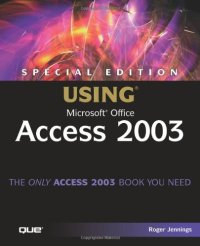
Ebook: Special Edition Using Microsoft Office Access 2003
Author: Roger Jennings
- Genre: Computers // Programming
- Year: 2003
- Publisher: Que
- Language: English
- pdf
Special Edition Using Microsoft Office Access 2003 is a comprehensive reference for all the features of Access 2003. This edition adds new chapters on collaboration with Microsoft SharePoint Team Server, and creating or consuming XML Web Services, both of which are hot topics. The XML chapter includes Access 2003's new XML export/import features.
The book's organization follows the development process for typical Access database applications. Detailed, step-by-step instructions with icons guide those who are new to Access through table design, data addition, importing data from external sources, query design and execution, and designing data entry forms and printed reports. Chapters on advanced form and report design emphasize data-entry efficiency and presentation clarity.
Amazon.com Review Billed as "The only Access 2003 book you need," Special Edition Using Microsoft Office Access 2003 is a comprehensive reference book that may well live up to its slogan. It covers all aspects of Microsoft's small but powerful database environment, from user-level features to Transact-SQL, Active Data Objects (ADO), and InfoPath. While you probably will want a separate reference for Visual Basic for Applications (VBA), or whatever programming environment you're using, this book indeed comprehensive in terms of Access 2003 itself. Coverage of T-SQL is particularly helpful, thanks to the author's extensive use of illustrative examples in those sections. Further, he takes care to help readers prepare for the imminent retirement of the Jet database engine and the required migration for Microsoft SQL Server.
Roger Jennings' coverage of the user-level part of Access (the editing, formatting, and design functions, and the wizards that make them easier to use) is standard Que fare, full of carefully indexed procedures and lots of hints and tips that call attention to potential problems and obscure capabilities. Later chapters--the ones that will be of greater interest to people doing application-development work--rely more heavily (and appropriately so) on code snippets and explanations of what they do. Even in the more programmer-oriented sections, though, there are numbered steps to follow in order to achieve desired effects, such as exporting data to XML and setting up an InfoPath form. --David Wall
Topics covered: User- and developer-level traits and capabilities of Microsoft Access 2003. Emphasis falls on relational database design, data entry and validation techniques, form design, sorting and reporting, CrossTabs and PivotTables, and Transact-SQL. There's coverage of the differences between the Jet database engine and the Microsoft SQL Server database environment, and notes on developing applications for both.